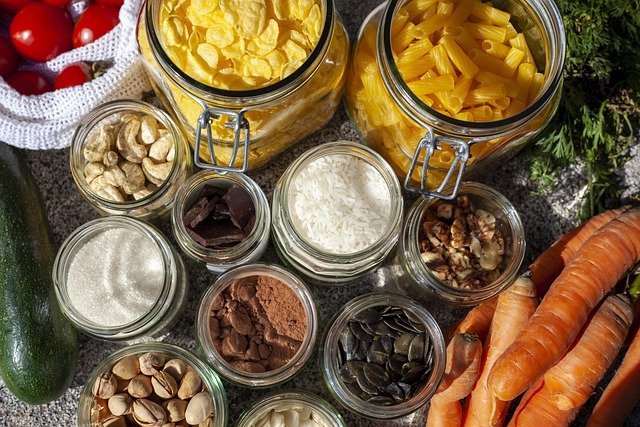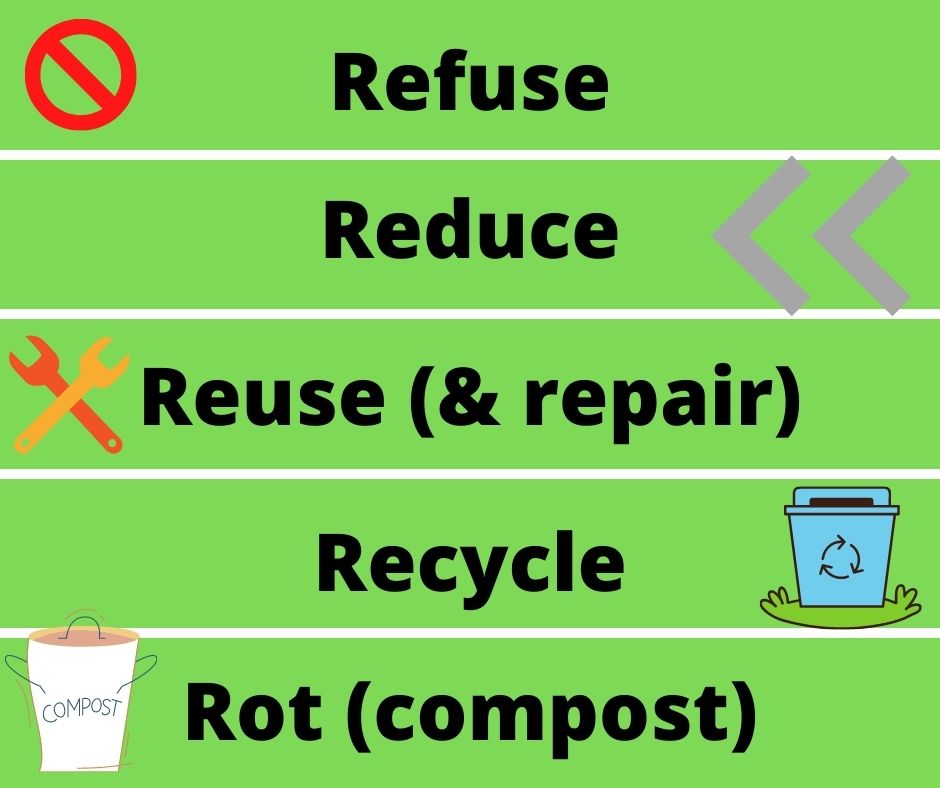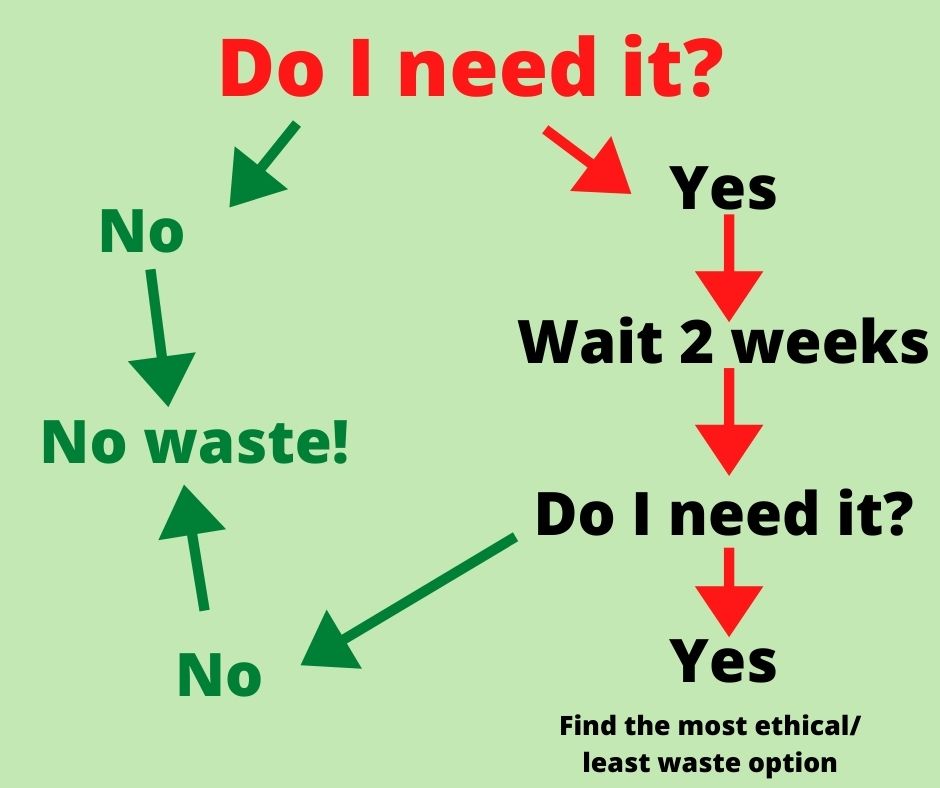Is a zero waste lifestyle possible (and where should I begin)?

Last night Carbon Neutral Aldbourne held an online zero waste event. We were joined by Hayley Lambert from Packaging Not Included, Marlborough’s first Zero Waste Shop. Hayley took us through an interesting tour of many aspects of our lives and talked us through how to minimise our waste in each area.
Is a zero waste lifestyle achievable?
Zero waste is certainly achievable and there are people who live a zero waste life and can fit their entire waste for the year inside a (small) jam jar! But this would require a big lifestyle change for most of us and good intentions can easily lead to overwhelm and then a disheartening sense of failure. Hayley made it clear that it is not all or nothing and that any changes that we make will make a difference. Making changes slowly and setting manageable targets can help to avoid overwhelm.
So what is the best way to start? – The zero waste life audit
Hayley recommends doing a life audit to work out where you are starting from and what changes need to be made. When tackling this there is no better place to start than in your bin. Not glamorous but vital if you really want to see what waste you are currently accumulating.
Your non-recyclable waste bin (which is taken off to landfill) is a good first choice as this is the rubbish which needs to be cut down the most. Here are some of the questions you might want to ask:
- What is your bin full of?
- Are the things in the bin all from essential purchases that you cannot live without?
- If not, what could you cut out/reduce/cut down on?
- If the products are essential, is there a way to get hold of them without the non-recyclable packaging?
It is likely that you will find some quick wins when doing this which will reduce the amount of waste you send to landfill straight away.
Next up is an audit of your recycling bins. For some this may seem odd as recycling is not waste because it is destined to be recycled. However, there is an energy cost to recycling and not all materials can be recycled indefinitely. Many materials, including plastic, degrade during the recycling process meaning that they will, over time, become non-recyclable waste. According to the Story of Plastic, only 2% of plastic is effectively recycled!
The 5Rs of zero waste is a good model to keep in mind when carrying out your audit.

- If it is not possible to refuse something is it possible to reduce the amount you use instead?
- When you are looking to replace something that is broken could you consider trying to fix it first?
- Could you purchase some reusable items (think water bottles, coffee cups, shopping bags) instead of always using single-use items?
What else should we include in our zero waste audit?
Hayley then took us through a number of different areas that we could consider when doing a zero waste life audit.
- Food
It is important to consider where our food is produced. Choosing to eat local food can be very limiting and is not always the best choice environmentally (according to Riverford, sun-ripened Spanish tomatoes use a tenth of the carbon used to grow British tomatoes with added heat outside of our growing season).
Other things to consider:
- How was the food transported? Avoid food which travelled by air.
- Seek out organic food (check out the EWG dirty dozen and clean fifteen)
- How is the food packaged? Can you get zero waste refills? Is the packaging compostable/recyclable?
What about avoiding food waste once you have made your purchases?
Hayley had the following top tips on how to avoid wasting the food which you have already bought:
- Meal planning – planning meals before you shop can help to avoid unnecessary purchases
- Use everything – keep track of what’s in your fridge and cupboards and use the things that will go off quickest first
- Cook from scratch – this avoids heavily packaged ready meals and lots of individually wrapped items
- Batch cooking – this allows you to buy in bulk which often cuts down on packaging
2. Personal Care
The first step is to decide which personal care items you think are essential. Most of us would not be keen on living without soap, shampoo and deodorant! But can we live without make up, fake tan and hair dye?
This is a personal choice for all of us to make but once these decisions are made it is important to think about where our products are coming from. Packaging is obviously an issue as most personal care items use plastic in their design and packaging. Do some research and try to find products with compostable packaging or products which can be refilled.
It is also important to consider the companies behind the brands. Cosmetics brands are often owned by huge companies with poor ethics. The companies may invest heavily in fossil fuels and they may test products on animals. Greenwash, where a company tries to present itself as environmentally friendly whilst still operating in a less than desirable way, is a big issue. Always be willing to look behind the label and question the companies that produce your favourite products. The Ethical Consumer website is an excellent place to start when trying to find out which companies are ethical and which should be avoided.
3. Stuff
This is a huge area to tackle but there are a few simple rules that can help us all to be less wasteful when it comes to our stuff.
The first rule is to not buy non-essential things. Simple but very hard to stick to! You could try setting yourself a challenge to not buy anything (other than food and essential items) for a month/year. If this seems like a step too far for now you could try the following rule instead:

Waiting and really evaluating a purchase avoids impulse purchases (something that can easily become an issue when shopping online). It also gives you time to research the item and find the most ethical version of it.
What about gifts?
This can be a particularly tricky area. What if you love giving gifts? What if you don’t want to appear mean by not giving a gift when others do?
Thinking carefully about the gifts you give can help to avoid waste. If you don’t know what the person will want why not give cash or a voucher so that they can choose something that they will definitely love and use. Or perhaps you could buy something second-hand? You could also look into alternative gifts like animal adoptions or charity giving. There are many thoughtful gift options that avoid the inevitable plastic tat that will end up in landfill.
4. Furniture and other house stuff
This is another area where the decision making process above applies. Do you really need it?
If the answer is yes then finding a second-hand version or choosing the most ethical and eco-friendly version you can find is better than opting for a cheap product which won’t last.
5. Electronics
E-waste is a major issue and in a society where laptops and phones are considered essential it can often seem unavoidable. But, again, there are ways to minimise the waste associated with these products.
- Do you always need to latest version or will the version you have last a bit longer?
- Can you find a refurbished version of the item you need?
- Can the item be reused/recycled when you have finished with it?
In Aldbourne we are lucky to have Green Machine Computers just down the road from us. They are well aware of the problems associated with e-waste and they are able to collect a wide range of items for refurbishment and recycling. Check out our blog for more details.
6. Home – energy and providers
Within the home it is well worth thinking about the waste associated with your use of energy. Switching to a 100% green energy supplier is very important. But you also need to ensure that you are not wasting energy in your home. Our renewable energy blog has some great info on switching your supplier and reducing your energy consumption.
It is also worth checking back in with Ethical Consumer to find an insurance company and a phone/internet provider with good ethics and excellent green credentials.
7. Work
This can be a tricky area where you have less control over the waste produced. But it is still worth evaluating your place of work to identify areas for improvement. For example:
- Does your office use recycled paper?
- Do you have recycling bins?
- Do you use single-use plastic in the kitchen?
- Is the printer set to double-sided?
- Are people advised not to print unless it is unavoidable?
- Do you have sensor lights in communal areas?
Asking these questions and others can get your managers thinking and could result in some changes that have a real impact.
Taking in your own packed lunch, a water bottle and a reusable coffee cup are all good ways to avoid unnecessary packaging throughout your day.
8. Transport
We all know by now that we should be flying and driving as little as possible. But what can we do to actually achieve this?
What is the public transport infrastructure like where you live? Around Aldbourne there are limited options available. Would a lift-sharing scheme be feasible? Could we lobby our council/MP to improve the infrastructure?
9. Money
Where we choose to put our money has a big influence on how our society is run and what industries are supported.
- Do you know whether your bank invests in fossil fuel companies?
- Does your bank have an ethical investment policy?
The detailed guides from Ethical Consumer can help you to ensure that your money is being used for good. Instead of propping up the companies you have been trying to avoid.
Zero waste shopping in and around Marlborough
Thank you so much to Hayley from Packaging Not Included for such a useful guide to avoiding waste. If you haven’t already paid a visit to Hayley’s shop in Marlborough we would definitely recommend you do so. Hayley sells a wide range of refill items and plastic free products including dried goods, cereals, fruit and nuts, flours, seeds, teas and coffee, honey, oils, herbs and spices, nut butters, cleaning products and personal care products.
Hayley also has a number of books on zero waste and other sustainability topics which you can borrow.
Good luck with your zero waste life audit and let us know how you get on.
